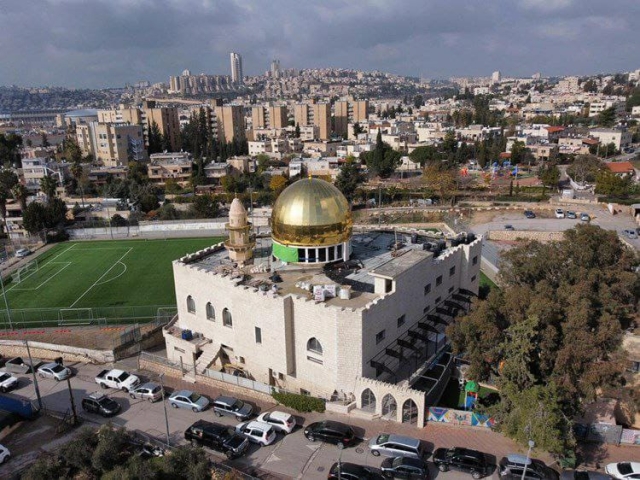Activists and residents of an East Jerusalem neighborhood are warning Jerusalem's municipality that violence could break out should the city go ahead with plans to tear down a mosque that was built illegally and has been deemed structurally in violation of safety regulations.
About a year after the Jerusalem municipality decided to destroy the "new Dome of the Rock " in the Beit Safafa neighborhood, and months after claims of selective enforcement and discrimination were made against it, the city has decided to reject the appeal claims and is demanding that "the mosque’s dome must be destroyed.
For decades, a 700-meter mosque, named "Abd Al-Rahman" or “servant of the merciful”, has been standing. It is one of four Muslim prayer centers in the Beit Safafa area of Jerusalem. Through the years Abd Al-Rahman has become dilapidated and required a thorough renovation. According to the lawsuit from Jerusalem, nearly six years ago they began to build an “additional floor with concrete walls with stone coatings without a permit, and above the floor, they built a five-meter high addition and placed iron constructions on top of it.”
Israel's Municipality of occupied Jerusalem has submitted a request to the Israeli District Court in the city to issue a demolition order against Abd Al-Rahman Mosque in Beit Safafa town. pic.twitter.com/9rofUtXhPs
— Quds News Network (@QudsNen) February 8, 2023
The engineering description in the lawsuit sounds quite ordinary, but the final result is a huge golden dome, which is almost completely identical to the golden dome above the head of 'The Dome of the Rock' next to the Al-Aqsa Mosque on the Temple Mount compound. At certain angles, it is not even possible to distinguish it from the massive structure built on top of what many believe to be the site of the Jewish Temple's 'Holy of Holies'. Due to the structure's iconography, the mosque’s destruction by the municipality due to building violations has become extremely controversial, with some fearing a violent uprising if the city carries through with its intentions.
In line with the Jerusalem Municipality's fight against illegal construction, and under pressure from right-wing organizations in the city, a demolition order was submitted to the Court of Local Affairs in Jerusalem. The residents of the neighborhood were surprised by the municipality's demand and said that they are a very quiet neighborhood, and added “the demolition could cause unnecessary conflicts and unnecessary chaos. We will work to prevent the demolition of this important mosque at all costs."
The lawyers who represent the opponents of the demolition submitted a number of claims to the court against the municipality. They claimed that it was selective enforcement, discrimination against the Arab public in the city and that the court was meddling in an arena that is not even legal. They also claimed that a long time passed between the construction and the request for demolition, which raises questions about the interest of the city.
The Jerusalem Municipality threatens to demolish the "New Al Aqsa Mosque" [in Beit Safafa] Residents Warn about Clashes
— Daniel Seidemann (@DanielSeidemann) February 7, 2023
Compensation for the deferral of yesterday's demolition?
They'll not rest until Jerusalem erupts.
Shared values.
Common interests.https://t.co/Yu4xemCTmY
The local committee for planning and building in Jerusalem responded to the claims in its own letter to the court. Regarding the claim about the selective enforcement between the prayer institutions in the city, the committee presented a list of ten synagogues that have been torn down over the last ten years among others for construction violations in the neighborhoods of Gila, Ramot, and Givat Shaul in the west of the city. The municipality’s statement further added: "An attempt to imply a different attitude of the applicant to religious institutions without any fundamentally wrong basis, is irrelevant, defiant, and misleading."
Illegal construction is rampant in Jerusalem among Arab and Jewish communities. The ultra-orthodox often protest the government's removal of illegal structures. Ensuring the integrity of structures is a vital component of a municipality's responsibility. In 2021 shoddy construction and overcrowding led to the deaths of 45 ultra-orthodox Jews at the gravesite of Rabbi Shimon bar Yochai on the Jewish holiday of Lag BaOmer in the northern town of Merom.


